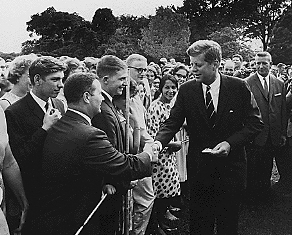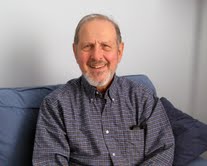Where Were You When John F. Kennedy Was Shot? Larry Lesser (Nigeria 1963-65) Remembers

JFK greets PCVs on the White House lawn in 1961
On November 22, 1963, I was in the middle of pre-deployment training at UCLA as a member of Nigeria IX. My wife and I were going to be English teachers. That morning our group was listening to a British professor lecture on something historical or cross-cultural when someone came to the back of the hall and called in that JFK had just been shot. After a brief moment to take in this shocking news the lecturer went on. A few minutes later someone again called in from the door at the rear of the lecture hall to tell us that the president was dead. For a minute we just sat there. The professor said something or other about what a terrible thing it was and then said he thought the best thing was to continue the lecture. (He was from the British stiff-upper-lip school.) But within a few minutes individual Peace Corps trainees quietly started leaving the room and the prof realized there was no point in trying to take our minds off the unthinkable news we had just received. He dismissed those of us still remaining in the room and we had to figure out what do we do now.
My wife and I went back to our room in the Dracker Hotel where I suddenly began sobbing uncontrollably. I liked Jack Kennedy, and even more I loved America and the idea of America. At once, without actually planning it and without knowing in advance for how long, I began fasting. My fast turned out to be for 36 hours – by far my longest ever, before or since. I don’t remember mentioning that I was fasting to anyone except my wife; it was just something I did to get through the emotional shock of the assassination.
At UCLA we Peace Corps trainees were asking one another whether they would call off the whole Peace Corps thing. The Peace Corps was so closely associated with our young president. It seems absurd now but we thought it was possible that the whole fabric of the U.S. government – and maybe of civilization itself – was in danger of unraveling. Had anyone contemplated the possibility that the president would be assassinated? Had anyone speculated about the consequences of such a heinous act? Although I had grown up in the shadow of the Cold War and the knowledge of the potential for nuclear destruction – indeed the Cuban missile crisis had occurred earlier in JFK’s term – I had never thought about the possibility of a presidential assassination.
Classes were cancelled for the next couple of days. However, one of our fellow-trainees had been asked to see a UCLA psychiatrist (that was part of the pre-departure process in those days if the training program managers had any doubts about your psychological fitness for the challenges of a Peace Corps tour) and the appointment was for the day after the assassination. He called the shrink to ask whether the appointment should be postponed under the circumstances but the shrink said he’d prefer to go ahead as scheduled. When trainee R showed up the next day the first thing the shrink asked him was what he thought of the killing of the president. R was so taken aback by the question under the circumstances that he more or less shut down and was not very responsive to that question or subsequent interview questions from the shrink. At the end of training a couple of weeks later just a handful of trainees were ‘selected out’ and told that Peace Corps wouldn’t send them to Nigeria after all. R was one of them (and since he was married that meant his wife was also selected out). He had told some of us about his unfortunate one-time experience with the psychiatrist. A few of us who thought that R was an excellent prospect put two and two together and guessed that the bad session with the shrink had been a major factor in the selection-out decision. We went to the training managers to urge them to reverse the decision. We said that R was highly qualified and an experienced and motivated teacher and we thought he would do very well across the cultural divide in Nigeria. His wife was also a terrific prospect. And we said that others in our group who had not been selected out were much less qualified and riskier propositions on cross-cultural sensitivity. That was our lay opinion. We expressed our doubts that the shrink’s evaluation had been professionally sound under the circumstances. The rules of confidentiality and secrecy surrounding the whole selection process prohibited the senior management of the training program from explaining any of the details of how they operated, but apparently they took our views seriously. R (and his wife) were reinstated and they served with distinction for the full two years as teachers in a Nigerian secondary school.
One more postscript to the JFK assassination: I was teaching commercial English and British economic history (and please don’t ask how that happened or how I was qualified to teach those subjects) to students at a post-secondary technical school in the regional capital city of Enugu. In a classroom discussion early in 1964 one of my students remarked offhandedly that of course the Kennedy assassination was a plot and LBJ was part of it. This way of looking at the killing had never crossed my mind. I was new to Nigeria and I responded angrily that no such thing was possible. But that incident stuck in my mind and over time it became integrated with other bits of cross-cultural insight. I have never personally subscribed to any of the conspiracy theories about the Kennedy assassination but I can understand how it could seem that way to a West African.
After serving as a PCV Larry Lesser (Nigeria 1963-65) joined the Foreign Service and served as a

Larry Lesser Today
State Department officer in two more African countries — Burkina Faso (which at that time was Upper Volta) and Rwanda, as well as in India, Belgium, and Bangladesh and Washington, D.C. Since retiring from the Foreign Service he has continued to do international work for the State Department and Peace Corps/Washington. He has participated in ten election observation missions in the former Yugoslavia and Soviet Union, and last year in Albania for the OSCE’s Office of Democratic Institutions and Human Rights (ODIHR).
I was visitng Pius, a friend, in his rooms in a back street in Lagos, Nigeria, in my second year as a Peace Corps volunteer. We overheard the news of Kennedy’s assassination on a radio from someone else’s room, and went to the hallway to confirm. Other residents gathered in the hall and shared the sense of shock and outrage.
Sixteen years later I set up my business on a street in the same part of Lagos and thought often of the experience of hearing the shocking news. In August this year 2013 I tried to pass the building where my business was located, but the road was under construction. I think the building where I’d been at the time of Kennedy’s assassination was gone. But the memory remains.
Marvelous story and an important part of Peace Corps and U.S. history. Also interesting to learn how the trainees took on the shrink. We still talked about deselection at the 50th.
Larry: A very moving account and kudos for reversing PC on the “deselection” of R and his wife. I was still in law school when JFK was assassinated and there is no story in that. However, there is a related PC story.
When my wife and I went into the Peace Corps in 1966, the entire group of Somali IVs were sent to the desolate tiny town in north eastern Somalia as a training exercise. Taleh had been the fort of Sayiid Mohamed Abdille Hassan, known by the British as the Mad Mullah, presumably because he had the audacity to engage in armed resistance to British Colonialism in the early 1900s. Our task was to move stones around and make the ruined fort look better. It had been bombed by the Brits in 1919 or so, allegedly the first use of aerial bombs on the African continent.
At Taleh, we worked with about 60 members of the Somali National Police Force. One night, around a campfire, one of the Police Officers said to a few of us, how sorry he was President Kennedy had been assassinated. I listened to his sincere words and thought, how had JFK been able to touch this Somali Muslim of nomadic background, who had never been outside of his native land and was probably illiterate? Fifty years later, with all the stories that tarnish JFK’s legacy, the fact that he reached people in remote areas of foreign countries and of course the institution of the Peace Corps and the thousands of volunteers who served, are reminders of what a real leader can accomplish.
In November of 1963 when President Kennedy was assassinated, I was in 9th grade and was passing between Algebra and Typing classes. My strongest memory of this time, however, was nearly five years later, in Malawi. My father was on contract with USAID, teaching for two years at the Polytechnic in Blantyre/Limbe.
I was fortunate to be able to work at the Poly as a lab tech in the Biology lab (at the Malawian wage rate, just until the first class of lab techs graduated). All my friends were Malawian students. One day that spring of 1968, not long after Martin Luther King was assassinated, my friends Jimmie Mwale and Aubrey R.S. Kabambe and I were socializing after lunch. Aubrey commented that Americans seem to kill their best people, referring to JFK and MLK. (The RFK assassination had not yet happened.) Jimmie responded that I, Linda, had nothing to do with that. This conversation has stayed with me ever since.
So 48 years ago in Malawi, technical school students who had grown up in villages without electricity or piped water, were very aware of what was going on in the US. A lesson that continues to speak to me to this day — the rest of the world is watching what is happening in America. As RPCV’s, I think we realize this perhaps more than others, but especially in our current political climate, I believe it is a very important lesson. Linda Barker, RPCV Rwanda 88-90